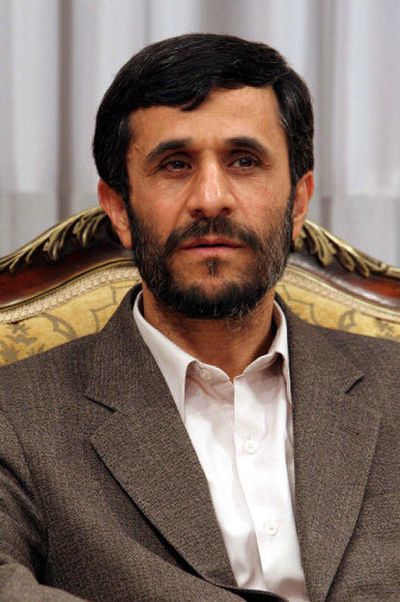U.S. wants answers on Iran’s new leader

The United States on Thursday challenged Iran to answer questions about the reported involvement of the nation’s new president in the 1979 seizure of American hostages in Tehran, saying former captives’ statements identifying him as a ringleader raise potentially troubling issues.
Mahmoud Ahmadinejad, the hard-line mayor of Tehran who decisively won a presidential runoff election last week, was identified by at least half a dozen former hostages as one of the militants who took over the U.S. Embassy in November 1979 and held 52 Americans captive for 444 days. Several former hostages said Ahmadinejad was present during harsh interrogations.
But leaders of the takeover said in Iran that Ahmadinejad was not part of their leadership group, and a spokesman for the president-elect denied that he played any role in the hostage-taking. Several former hostages also said they do not remember Ahmadinejad as being among their captors.
The controversy revived bitter memories of the embassy seizure and brought to the forefront a dispute that has simmered for 26 years. Diplomatic relations between the two countries were broken over the hostage crisis and have never been restored.
For some former hostages, the issue also brought back vivid recollections of a long and often painful ordeal at the hands of militants who seized the embassy on Nov. 4, 1979, and did not release their captives until the day President Jimmy Carter left office in January 1981.
President Bush, speaking to reporters about the upcoming Group of Eight summit meeting in Scotland, said he had “no information” on Ahmadinejad’s alleged role in the embassy takeover. “But obviously, his involvement raises many questions,” Bush said, adding that he was confident answers would be found.
A State Department spokesman, Sean McCormack, said the government will “look into this question seriously” to establish the facts. “We have not forgotten” that U.S. diplomats were taken hostage and held for more than a year, he said.
Stephen Hadley, Bush’s national security adviser, said the prospect that Ahmadinejad was a violator of international law for his alleged role in the hostage-taking is “one of the things we’ll have to take a look at.”
Hadley stressed at a news briefing that “we’re obviously going to have to deal with the Iranian government” headed by Ahmadinejad on such matters as Iran’s nuclear program, and he called on the new government to assure the world that it is not pursuing nuclear weapons.
For the Bush administration, Iran has presented a major foreign policy challenge. Divisions within the administration during Bush’s first term left the White House paralyzed over whether to contain Iran or more actively promote “regime change.” U.S. officials said Thursday that the administration intends to take a tougher line toward the Iranian government.
Since the election upset last week, in which Ahmadinejad scored a landslide victory, the Bush administration has ratcheted up its criticism of the theocracy. The State Department called on Wednesday for the “immediate and unconditional” release of Akbar Ganji, an Iranian journalist who has challenged Iran’s leaders and has advocated reform.
Among the former hostages convinced of Ahmadinejad’s role in their ordeal is retired Col. David Roeder, 66, who served as deputy Air Force attache at the embassy. In a telephone interview from North Carolina, he said Ahmadinejad was present at about a third of his roughly 45 interrogation sessions after the takeover.
Roeder, who was among the most harshly interrogated of the hostages, said Ahmadinejad “seemed to be the next level above the interrogators and the interpreters and the guards.” Roeder said he remembers Ahmadinejad well because he was present the first time that interrogators made a specific threat to kidnap Roeder’s handicapped son in the United States and mutilate him “if I didn’t start to cooperate.”
“That was scary,” he said.
Kevin Hermening, who was a 21-year-old Marine guard at the embassy and the youngest of the hostages, said of the Iranian president-elect: “It sure seems to me that he was the person doing the interrogations that first day of the captivity. When I looked at his photograph during the election runoff, it looked like him.”
After the charges surfaced, federal agencies began investigating Thursday, examining video and still pictures of the hostage-takers, combing their files and calling in former captives for interviews.
Ahmadinejad’s office in Tehran vehemently denied the assertions. Associates of the president-elect said he had opposed the takeover, focusing instead on fighting communist and Marxist elements in Iran, news agencies reported.
Separate denials also came from two of the takeover’s top student organizers, both considered reformers opposed to Ahmadinejad’s election.
“Even if 52 hostages say he was interrogating them, they’re either lying or making it up,” Abbas Abdi, one of the former organizers, said in a telephone interview from Tehran. “He didn’t do it. He wasn’t among them at all, for sure.”
Iran’s president-elect might have come through the U.S. Embassy compound as “many other students came in,” Abdi said, speaking through an interpreter. “But he wasn’t among the embassy students at all. He was definitely not a member of the students” who organized the seizure, Abdi said.
Ibrahim Asgharzadeh, who for years has acknowledged being the mastermind of the takeover, also said Ahmadinejad was not among the leaders. “The leaders are all well known,” he said. “Everybody knows them, and he was not among them.”